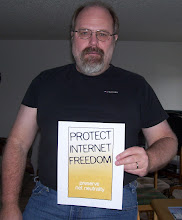 Jack Herer Photo courtesy americancannabis.org
Jack Herer Photo courtesy americancannabis.orgNoted activist and author Jack Herer, "The Emperor of Hemp," is fighting for his life after giving an impassioned speech at the Portland (OR) HempStalk festival Saturday, Sept 12. Herer left the stage and collapsed with an apparently serious heart attack, according to fellow activist Chris Conrad, who was on the scene.
"He was taken from the site by ambulance and hospitalized and was undergoing a procedure and his condition was most recently reported to be stable," Conrad said. "His wife, Jeannie, was not with him at the time and has been in touch with the hospital by telephone." According to Contrad, the rest of the Hempstalk festival continued as scheduled.
"Ironically, I was on stage talking about my work with Jack and his special affection for Oregon and its activists while, unbeknownst to me, medical personnel were working backstage to save his life," Conrad said.
Salem-News.com reports that Jack was in critical condition when he was admitted to the hospital with his son at his side. Soon after that, they were told that he was the victim of a heart attack, a result of arterial blockage.
In July 2000, Herer suffered a minor heart attack and a major stroke, resulting in difficulties speaking and moving the right side of his body. He mostly recovered, and
said in May 2004 that treatment with the psychoactive mushroom amanita muscaria was the secret.
 Jack Herer
Jack Herer
Photo: forum.sensiseeds.comWhen Herer's seminal work
The Emperor Wears No Clothes (which Jack generously made
available in its entirety online) was published in 1985, the book reframed the debate about cannabis/hemp in the U.S. and worldwide. (You can buy a paper copy
here.)
A former Goldwater Republican, Herer became a pro-marijuana and hemp activist. In addition to the aforementioned
The Emperor Wears No Clothes, he wrote another book (in a collaboration with Al Emmanuel),
G.R.A.S.S.: Great Revolutionary American Standard System, which proposed a 1-10 rating system for pot potency and quality of high. I bought this one at a headshop in Florence, Ala., back when I was about 20 and had no idea who Jack Herer was... I was just intrigued by the concept. Of course, when Jack got famous a few years later with
Emperor, I knew his name sounded familiar.
The Emperor of Hemp a documentary film about his life, was released in 1999.
Herer says that the hemp plant should be legalized because it has been shown to be a renewable source of fuel, food, and medicine, and can be grown in virtually any part of the world. He further avers that the U.S. government deliberately hides the proof of hemp's usefulness, in collusion with certain chemical and paper financial interests.
 Jack Herer buds Photo: jazminmillion
Jack Herer buds Photo: jazminmillionIn a fitting tribute to this great man of ganja, Herer has a potent strain of marijuana named after him. The
Jack Herer strain is a cross between Skunk #1, Northern Lights #5 and Haze. It was named this way in honor of Jack Herer by Ben Dronkers, founder of the Sensi Seed Bank. It has sativa dominant characteristics, flowering time up to 75 days. It is a very popular strain, winning the High Times Cannabis Cup several years running.
JackHerer.com: Jack's Home On The Web
 We got their Zig Zags, too! (Photo: policeone.com)
We got their Zig Zags, too! (Photo: policeone.com)







































